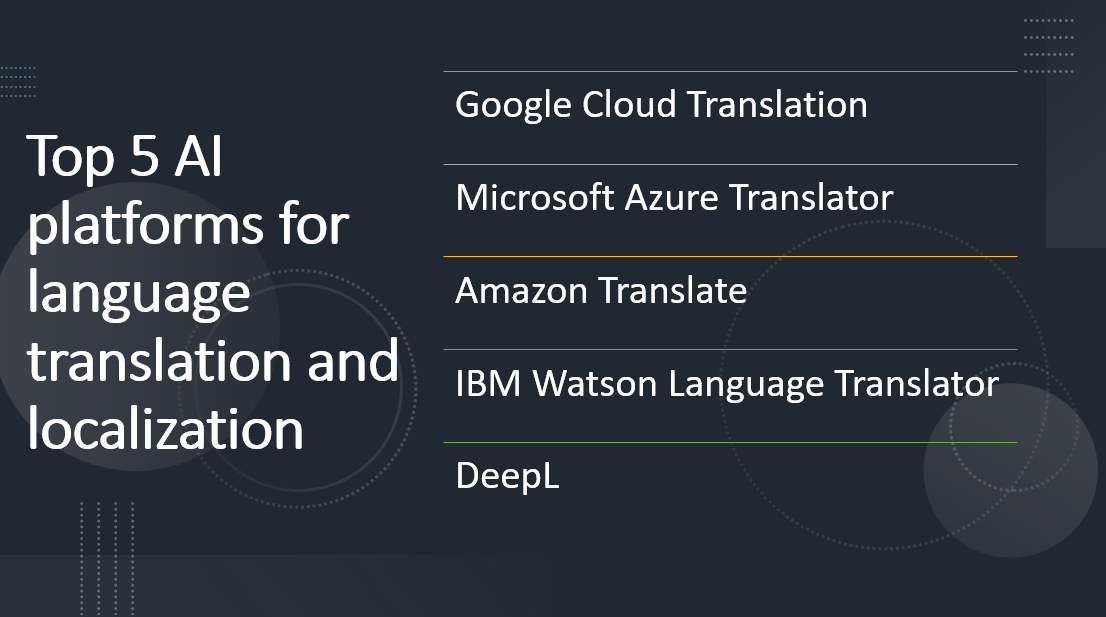
Introduction
Language translation and localization are crucial for breaking down barriers and enabling effective communication in a globalized world. Artificial Intelligence (AI) platforms have revolutionized language translation by providing advanced algorithms and tools to automate and enhance the translation process.
In this blog post, we will explore the top five AI platforms for language translation and localization, empowering businesses and individuals to bridge language gaps and expand their global reach.
Why use AI platforms for language translation and localization?
- AI platforms provide accurate translations and preserve the meaning and context of the source text.
- AI automates the translation process, saving time and resources.
- AI platforms can handle multiple languages and large volumes of text.
- AI platforms offer options for customizing translations to specific industry or brand needs.
Related Reading:
Here Are Our Top 5 AI platforms for language translation and localization:
1: Google Cloud Translation
Overview and Importance
Google Cloud Translation is a leading AI platform for language translation and localization. It enables businesses to translate text between languages and localize their content to reach a global audience.
Learn more about Google Cloud Translation
Key Features and Capabilities
Language Translation
- Google Cloud Translation supports the translation of text between multiple languages, including common languages and specialized domains.
Neural Machine Translation
- It leverages advanced neural machine translation models to provide accurate and natural-sounding translations.
Localization Support
- The platform offers features to assist with content localization, such as language detection, language-specific translations, and customizable glossaries.
2: Microsoft Azure Translator
Overview and Importance
Microsoft Azure Translator is an AI platform that offers language translation and localization services. It enables businesses to break down language barriers, communicate effectively across languages, and expand their global presence.
Learn more about Microsoft Azure Translator
Key Features and Capabilities
Multi-Language Support
- Azure Translator supports translation between a wide range of languages, allowing businesses to reach a diverse audience.
Customization Options
- The platform provides customization capabilities, allowing users to tailor translations to specific industry domains or company-specific terminology.
Real-Time Translation
- Azure Translator offers real-time translation capabilities, enabling seamless communication in multilingual scenarios such as customer support or live events.
Related Reading:
3: Amazon Translate
Overview and Importance
Amazon Translate is an AI platform designed for language translation and localization. It leverages advanced machine learning techniques to provide accurate and efficient translation services, enabling businesses to communicate effectively across different languages and cultures.
Learn more about Microsoft Azure Translator
Key Features and Capabilities
Neural Machine Translation
- Amazon Translate utilizes neural machine translation models to deliver high-quality translations that capture the nuances of language.
Real-Time Translation
- The platform supports real-time translation, allowing for seamless communication in various scenarios such as customer support or international conferences.
Custom Terminology
- Amazon Translate enables users to create and manage custom terminology, ensuring accurate translation of industry-specific or brand-specific terms.
4: IBM Watson Language Translator
Overview and Importance
IBM Watson Language Translator is an AI platform that provides robust language translation and localization capabilities. It leverages machine learning algorithms and natural language processing techniques to enable seamless communication and content adaptation across multiple languages.
Learn more about IBM Watson Language Translator
Key Features and Capabilities
Language Translation
- IBM Watson Language Translator supports the translation of text and documents between various languages, enabling businesses to engage with a global audience effectively.
Language Identification
- The platform can automatically detect the language of a given text, facilitating the accurate translation process.
Customization and Domain Adaptation
- IBM Watson Language Translator allows users to customize and fine-tune translation models based on specific industry domains or specialized vocabularies, ensuring accurate and contextually relevant translations.
Related Reading:
5: DeepL
Overview and Importance
DeepL is an AI platform for language translation and localization that utilizes deep learning models to provide high-quality translations. With its advanced neural machine translation technology, DeepL aims to bridge language barriers and enable seamless communication across different languages.
Key Features and Capabilities
Neural Machine Translation
- DeepL employs state-of-the-art neural machine translation models that leverage deep learning techniques to generate accurate and natural-sounding translations.
Multiple Language Support
- DeepL supports a wide range of languages, allowing users to translate text between various language pairs.
Contextual Understanding
- The platform takes into account the context of the text being translated, resulting in more accurate and contextually appropriate translations.
Conclusion
AI platforms play a significant role in language translation and localization, automating the translation process and ensuring accuracy. The top five AI platforms for language translation and localization are Google Cloud Translation, Microsoft Azure Translator, Amazon Translate, IBM Watson Language Translator, and DeepL.
Here are their key features, capabilities, and advantages:
Google Cloud Translation: Offers high-quality machine translation across multiple languages, with support for real-time translation and integration with other Google Cloud services.
Microsoft Azure Translator: Provides a scalable and customizable translation solution, supporting various languages and offering language detection and speech translation capabilities.
Amazon Translate: A fully managed service for neural machine translation, allowing businesses to localize content and deliver accurate translations quickly.
IBM Watson Language Translator: Leverages advanced AI technologies for translation, supporting multiple languages and offering customization options to align with specific terminology or industry needs.
DeepL: Utilizes deep learning algorithms for translation, providing accurate and natural-sounding translations across multiple languages.
The impact of AI in language translation and localization is significant:
Overcoming language barriers: AI platforms enable effective communication across language barriers, allowing businesses and individuals to engage with global audiences.
Multilingual communication: AI translation facilitates multilingual communication, enhancing collaboration and understanding in diverse environments.
Expanding global reach: By leveraging AI translation capabilities, businesses can expand their global reach and cater to international markets effectively.
Businesses and individuals are encouraged to explore these AI platforms and leverage their advanced translation capabilities. By utilizing these platforms, they can engage with global audiences, deliver accurate translations, and overcome language barriers. The use of AI in language translation and localization enables effective communication in a globalized world, fostering cultural exchange, and driving international success.